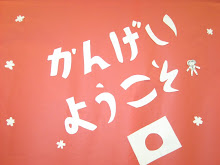Wednesday, January 6, 2010 A Block Two Day
JAPANESE 3 -- First period
This class does not meet on Block Two days.
JAPANESE 1 – Fifth period
Dictation Sentences:
1. Japanese New Year is great.
おしょうがつ は すごい です。
2. Please eat mochi.
もち を たべて ください。
3. Please watch sumo.
おすもう を みて ください。
4. Everyone likes Japanese New Year.
みんなさん は おしょうがつ が すき です。
5. January 15th is not Japanese New Year.
一月十五日 は おしょうがつ
じゃ ない です。 or
で は ありません。
Be sure to study the above!
We will be performing original dialogues this year during the official exam period. Think about who you might like to work with. Performance will be in pairs, with each person handing in a copy of the dialogue in both Japanese and English translation.
JAPANESE 2 Sixth Period
Handed out preliminary first semester review summary.
Detail about Japan’s New Year from handout issued today. Source: 日本のくらし12k月:Moons, Months and Seasons, Intermediate Japanese Reader
Weather Presentations:
Jason D. spoke about Hong Kong.
Dashona J. has not yet spoken about Strasbourg.
Zack A. will speak about Geneva, if he is able to be present.
Ray T. has not yet spoken about Seattle.
Betty N. spoke about New York.
Martina C. has not yet spoken about Paris.
Don’t forget kanji:
日、月、木、本
本 As “tree” plus mark indicating root or origin
Japan as “sun’s source” – 日本
にほん 日本
にほんご 日本語
Days of week: 日、月、火、水、木 金、土
Study!
Remember these kanji:
目 め Eye; 耳 みみ Ear
大きい Big おおきい; 手 て Hand
口 くち Mouth; 足 あし Feet/legs
Reminder: We all must be polite in the Japanese language classroom. Not only is it important in our lives in general – it is an essential part of Japanese culture. ください、おねがい します、ありがとう、すみません Are the most important words and phrases in Japanese.
JAPANESE 4 and AP – Seventh period
Elizabeth A. and Tommy Y. gave their presentations on Flower Festival and 元日、respectively.
AP students spoke about their winter vacations and we asked about Japanese New Year. They were to have used information from
日本のくらし12k月:Moons, Months and Seasons, Intermediate Japanese Reader
お正月のこと from the handout – students should have been able to talk about these vocabulary items, which had explanations in English in addition to the Japanese narrative text. These items will be on the semester final.
おせち 料理(りょうり)
おとそ
おぞうに
門松(かどまつ)
しめかざり
おとしだま
初詣(はつもうで)
春の七草(はる の ななくさ)
成人式(せいじんしき)
相撲(すもう)
Handout about 日本の一月・お正月 in Japanese from 日本のくらし12か月:Moons, Months, and Seasons, an Intermediate Japanese Reader
Collected POI for article about 1300th anniversary of Japan’s first capitol city, Nara—plus 8 sentences in Japanese on content of this article
Collected beautiful version of Year of the Tiger haiku, above—kanji for mist, stand/rise, astrological tiger, and year were written large on board
Discussion of oral assignment for final:
AP Jpn: Each student must be a travel agent and present a week-long tour of the Japanese city of your choice (and its surroundings). Speak as if you were talking to potential customers, convincing them about how wonderful your tour will be. Detail all travel arrangements, costs, events and sightseeing destinations. Student may choose the time of year. Use as much vocabulary and structures as possible from 2 Nakama, Chapter 2
Elizabeth A.: Tokyo
Lalita A.: Sapporo
Anton H.: Kyoto
Jerome M.: Osaka
Mike S.: Naha
Connie Y.: Nara
Tommy Y: Nagasaki?
Amy Z.: Nagoya
Jpn 4: working in pairs, students will create and perform a dialogue, playing the roles of colleague travel agents who are planning a week-long tour to a particular city of their choice, discussing modes of transport, hotels, sightseeing, weather, costs, etc.
Pairs:
Camille B. and Jenny J.
Johnny C. and Azrieal W.
Jerome-kun found outstanding website for watching and listening to Japanese weather forecasts:
http://weathernews.jp
Useful website for vocabulary: search for Denshi Jisho in Google, has vocab and also information on each kanji constituting a word.
REMINDER: In doing high school assignments or college assignments or tasks out in the world, every one of us should be trying to do the best and most complete work possible, not the least possible.
About Me

- O.Kimeru
- M.A. 1992 from U. of Chicago; Japan Foundation Fellow in 1987-88; research fellow Yokohama City University; Japanese language teacher since 1991; also taught French (member American Association of Teachers of French), English as a Second Language (to students), methodology of teaching ESL (to Japanese high school teachers), English, Japanese history/culture, drama; in 2002 and 2004, listed in Who's Who Among America's Teachers; member of Chicago Sister Cities Osaka Committee, and chair of its Education Sub-Committee; vice-president Illinois Association of Teachers of Japanese; Payton H.S. World Language Department Chair from 2003-2007, under founding principal Mrs. Gail Ward; taught Japanese and coordinated Japan Exchange at Payton from 2003 to 2010; Japanese teacher at Burr Public School beginning August, 2010
Followers
Blog Archive
-
▼
2010
(88)
-
▼
January
(17)
- January 28, 2010 An Eight Period Day
- January 27, 2010 A Block Two Day
- January 26, 2010 Tuesday A Block One Day
- January 20, 22, and 25, 2010
- January 19, 2010 An Eight Period Day
- January 15, 2010 An Eight Period Day
- January 13, 2010 A Block Two Day
- January 12, 2010 A Block One Day
- January 11, 2010 An Eight Period Day
- January 8, 2010 An Eight Period Day
- Japanese 4/AP first semester review summary
- Japanese 3 first semester review summary
- January 6, 2010 A Block Two Day
- Japanese 2 first semester review summary
- Japanese 1 first semester review summary
- January 5, 2009 A Block One day
- January 4, 2010 An Eight Period Day
-
▼
January
(17)